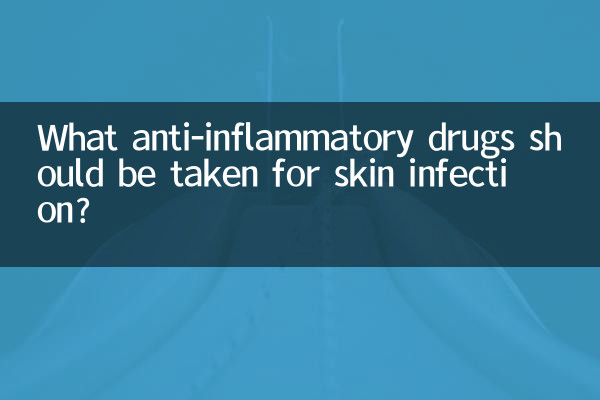What anti-inflammatory drugs should be taken for skin infection?
Skin infections are common health problems that can be caused by bacteria, fungi, or viruses. Choosing the right anti-inflammatories is crucial for speedy recovery. This article will provide you with detailed medication suggestions and precautions based on the hot topics and hot content on the Internet in the past 10 days.
1. Common types of skin infections and corresponding anti-inflammatory drugs

| Type of infection | Common symptoms | Recommended anti-inflammatory drugs |
|---|---|---|
| bacterial infection | redness, pain, pus | Amoxicillin, cephalexin, erythromycin ointment |
| fungal infection | Itching, scaling, annular erythema | Clotrimazole, terbinafine, ketoconazole |
| viral infection | blisters, pain, burning sensation | Acyclovir, valacyclovir |
2. Guidelines for the use of oral anti-inflammatory drugs
| Drug name | Applicable symptoms | Usage and dosage | Things to note |
|---|---|---|---|
| amoxicillin | mild to moderate bacterial infection | Adults: 500 mg every 8 hours | Contraindicated for those allergic to penicillin |
| Cephalexin | Skin and soft tissue infections | Adults: 250-500mg each time, 4 times a day | Avoid taking it with alcohol |
| Erythromycin | People allergic to penicillin | Adults: 250-500mg, once every 6 hours | May cause gastrointestinal discomfort |
3. Suggestions for selecting topical anti-inflammatory drugs
| Drug type | Representative medicine | Applicable situations | Frequency of use |
|---|---|---|---|
| antibiotic ointment | Erythromycin ointment | small bacterial infection | 2-3 times a day |
| antifungal cream | clotrimazole cream | Tinea pedis, tinea corporis, etc. | 1-2 times a day |
| antiviral ointment | Acyclovir ointment | Herpes simplex, herpes zoster | 4-6 times a day |
4. Dietary recommendations during skin infection
1.drink more water: Staying hydrated helps eliminate toxins.
2.Supplement vitamin C: Can enhance immunity and promote wound healing.
3.Avoid spicy food: May aggravate inflammatory response.
4.Appropriate amount of protein supplement: Helps in tissue repair.
5. When Do You Need Medical Treatment?
1. The infection area is large or continues to spread
2. Fever and other systemic symptoms occur
3. Symptoms do not improve after 3 days of self-medication
4. Suffering from underlying diseases such as diabetes
5. Pregnant or breastfeeding women
6. Medication Safety Tips
1. Take medication strictly according to doctor’s instructions or instructions
2. Do not increase or decrease the dosage of medicine or stop medicine at will
3. Pay attention to adverse drug reactions
4. Clean the affected area before applying topical medication
5. Avoid long-term use of antibiotics
Treatment of skin infections requires the selection of appropriate anti-inflammatory drugs based on the specific cause. For mild infections, topical medications can be tried. For serious or persistent infections, seek medical attention promptly. While using medication rationally, it is also important to maintain good personal hygiene habits. I hope this article can provide you with practical reference information.

check the details

check the details